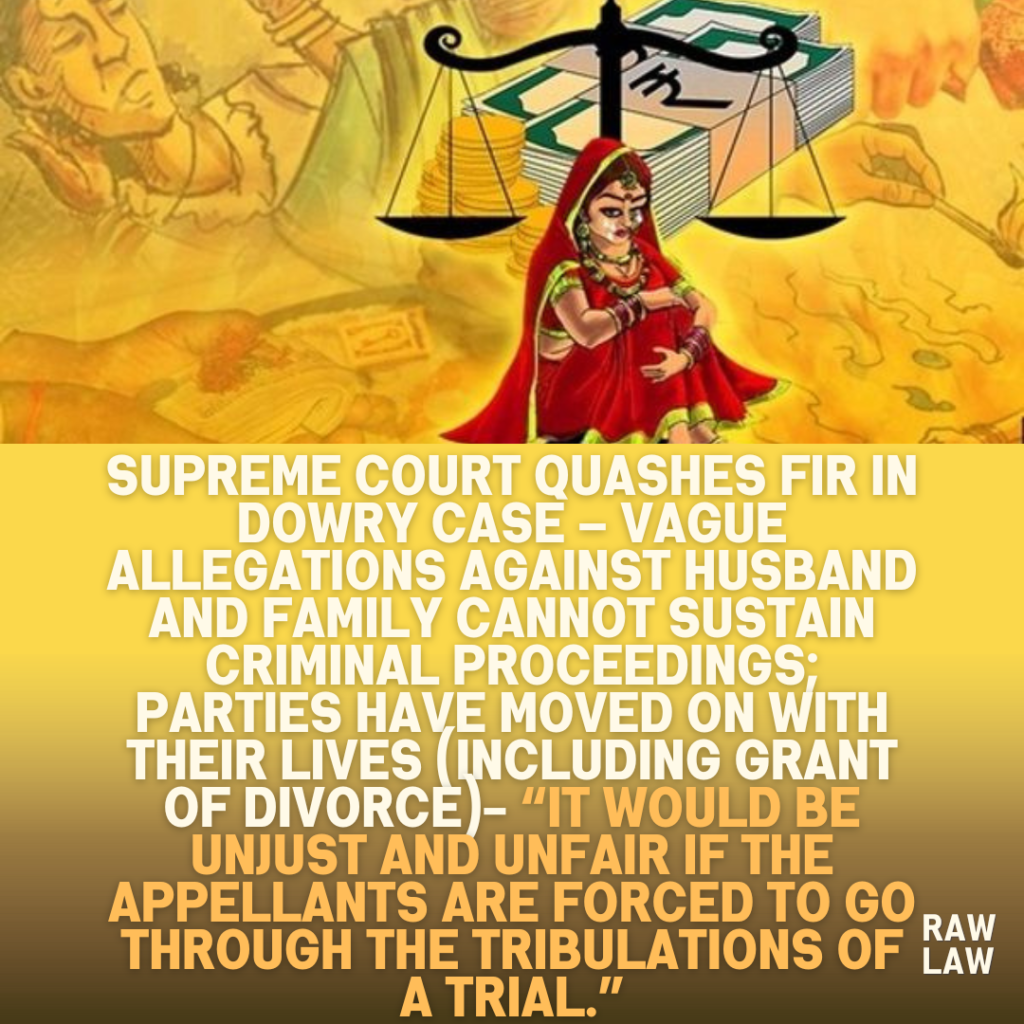Court’s Decision
The Supreme Court in Ghanshyam Soni v. State (Govt. of NCT of Delhi) quashed FIR No. 1098/2002 dated 19.12.2002 and the corresponding chargesheet dated 27.07.2004 registered under Sections 498A and 34 IPC, observing that:
“No prima facie case is made out against the Appellant or his family… it would be unjust and unfair if the Appellants are forced to go through the tribulations of a trial.”
Despite acknowledging that the complaint was filed within the statutory limitation period under Section 468 CrPC, the Court exercised its powers under Article 142 of the Constitution to quash the proceedings in the interest of justice due to the lack of specific, reliable, and substantiated allegations.
Facts
The marriage between the appellant and the complainant was solemnised on 28.02.1998. Both were serving as Sub-Inspectors in the Delhi Police. The complainant alleged that soon after marriage, she faced mental and physical cruelty from the appellant and his family for bringing insufficient dowry, including specific demands for cash, a car, and a house.
Key events included:
- A physical assault on 27.04.1999, after which the complainant returned to her parental home.
- Alleged threats by the appellant with a dagger on 04.09.1999.
- Being thrown out of the matrimonial home on 08.09.1999 and denied her belongings.
- Assault during pregnancy on 06.12.1999, which led to a withdrawn complaint on 12.12.1999.
- The final complaint dated 03.07.2002, leading to registration of FIR No. 1098/2002 under Sections 498A, 406, and 34 IPC.
Charges under Section 406 IPC were dropped, and charges under Section 498A read with Section 34 IPC were framed by the Magistrate. The Sessions Court later discharged all accused under those charges citing limitation and lack of prima facie case.
Issues
- Whether the complaint filed in 2002 was barred by limitation under Section 468 CrPC.
- Whether a prima facie case of cruelty under Section 498A IPC was made out against the appellant and his family.
- Whether the Sessions Court and High Court had rightly exercised their respective revisionary and inherent powers.
Petitioner’s Arguments
The appellant contended that:
- The Sessions Court had rightly discharged him and his family.
- The complaint was time-barred since the alleged incidents occurred in 1999, while cognizance was taken only in 2004.
- There was no explanation for the delay and no material change in successive complaints.
- Allegations were vague, baseless, and lacked corroborative evidence or medical records.
- The complainant, being a police officer, misused her position to implicate multiple relatives with omnibus allegations.
Respondent’s Arguments
The complainant and the State argued:
- The complaint dated 03.07.2002 was within the three-year limitation period.
- Section 498A being a continuing offence, the date of last incident of cruelty should be considered.
- The Sessions Court’s discharge order was based on presumptions and stereotypes, particularly because the complainant was a police officer.
- Serious allegations of cruelty warranted a full trial, not discharge.
Analysis of the Law
The Court reiterated that under Section 468 CrPC, the relevant date for computing limitation is the date of filing the complaint or institution of proceedings—not the date of taking cognizance. Referring to Bharat Damodar Kale v. State of A.P., the Court stated:
“If the filing of the complaint or initiation of proceedings has been taken within the period of limitation, the complainant is not responsible for any delay on the part of the court or Magistrate.”
Additionally, in Kamatchi v. Lakshmi Narayanan, the Court held that:
“A complainant should not be prejudiced if for reasons beyond their control, cognizance was taken after the limitation period.”
Precedent Analysis
The Court cited the following key judgments:
- K. Subba Rao v. State of Telangana, (2018) 14 SCC 452: Warned against roping in distant relatives in dowry cases without specific allegations.
- Jaydedeepsinh Pravinsinh Chavda v. State of Gujarat, 2024 INSC 960: Stressed the need for specific allegations with supporting evidence in 498A cases.
- Rajesh Chaddha v. State of Uttar Pradesh, 2025 INSC 671: Reiterated the requirement for detailed factual allegations to sustain a charge under Section 498A.
- Dara Lakshmi Narayana v. State of Telangana, 2024 INSC 953: Condemned misuse of legal provisions by implicating an array of relatives without credible allegations.
- Preeti Gupta v. State of Jharkhand, [2010] 7 SCC 667: Cautioned courts against accepting vague and omnibus allegations in matrimonial disputes.
Court’s Reasoning
The Court found the allegations against the appellant and his family to be vague and lacking in specificity. There were no detailed accounts or corroborative medical evidence to substantiate claims of cruelty or dowry demands. Allegations against other family members, including a tailor, were viewed as sweeping and accusatory without substantive backing.
Importantly, the Court criticised the Sessions Court for relying on the complainant’s profession as a ground for discharge, but also held that the High Court’s emotional emphasis on this factor ignored the lack of evidence.
“Judicial decision cannot be blurred to the actual facts and circumstances of a case.”
Conclusion
The Supreme Court held that no prima facie case was made out. The complaint dated 03.07.2002 was within limitation, and the Sessions Court’s error in applying Section 473 CrPC was irrelevant. However, due to the lack of substantive evidence and the fact that the parties had since moved on with their lives (including the grant of divorce), the FIR and chargesheet were quashed.
“It would be unjust and unfair if the Appellants are forced to go through the tribulations of a trial.”
The appeals were allowed.
Implications
- Reinforces judicial caution in matrimonial disputes under Section 498A IPC, especially where vague allegations are made against multiple family members.
- Affirms that filing date—not cognizance—is relevant for limitation under Section 468 CrPC.
- Underlines the constitutional role of Article 142 in preventing abuse of the criminal process in matrimonial disputes.
- Reinforces the requirement of substantiated, specific, and credible allegations to proceed to trial in cases of alleged cruelty.
Also Read: Delhi High Court Upholds DRAT Order Allowing Auction of Defaulter’s Property
